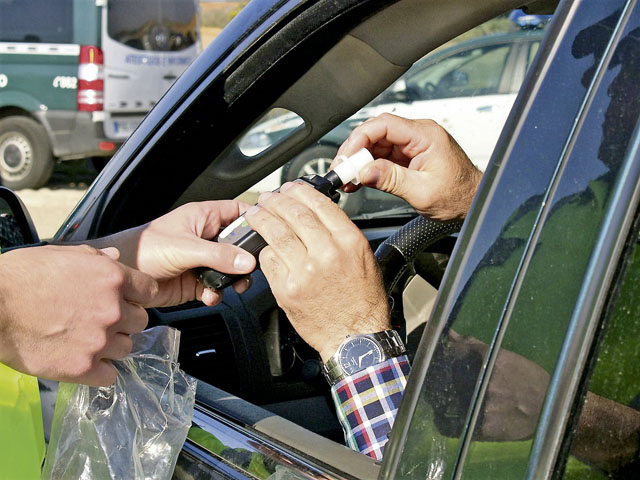
Barbecues, village festivals and get-togethers where alcohol is served may be a huge part of summertime fun in Germany, but the consequences of driving under the influence afterward can be a sobering reality check.
Driving under the influence of alcohol or drugs not only endangers others, but jeopardizes government civilian careers and disrupts lives, said Robert Leist, U.S. Army Garrison Rheinland-Pfalz Civilian Misconduct officer.
“Government civilian employees and command-sponsored family members are subject to the criminal jurisdiction of the host-nation authorities and the administrative jurisdiction of U.S. forces under the NATO Status of Forces Agreement with established civilian misconduct programs,” Leist explained. “Civilians receiving logistical support also fall under the civilian misconduct jurisdiction. Host-nation authorities maintain criminal jurisdiction, so they will typically assign fines, fees, penalties and determine guilt or innocence. DUIs are normally processed through host-nation criminal court.”
According to host-nation DUI laws, violating 0.05 percent blood alcohol concentration or driving under the influence of drugs will result in the following consequences:
- First Offense: 500€ fine, two point reduction and one-month driving suspension
- Second Offense: 1,000€ fine, two point reduction and a three-month driving suspension
- Third Offense: 1,500€ fine, two point reduction and a three-month suspension.
- Tougher DUI penalties and fines are issued by host-nation authorities if drivers endanger road traffic or their BAC is greater than 0.109 percent.
Although U.S. civilian drivers with DUIs have host-nation penalties and fines to contend with, they will still deal with Army reprimands as well, said Rick Anderson, USAG RP Civilian Misconduct officer.
“For certain BACs, German authorities may suspend a license for 90 days, but Army in Europe Regulation 190-1 requires a revocation of one year for the offense,” he said. “Whether you are a government civilian employee, government contractor or family member, if you are affiliated with the U.S. forces and receive logistical support, you must pay the host-nation fines and also abide by AER 190-1 with the revocation of your license, regardless if host-nation authorities only remove driving privileges for 90 days.”
There is a difference between host-nation license suspensions and required U.S. forces license suspensions and revocations, Anderson said.
“According to AER 190-1, operation of a vehicle with 0.05 to 0.079 percent BAC will be a mandatory 90-day license suspension; 0.08 percent BAC or higher is a mandatory license revocation with petitioned reinstatement authorized after one year,” Anderson explained. “People who commit a second offense lose their license for five years; a third offense prohibits them from ever possessing a U.S. Forces Certificate of License again.”
DUI includes drugs as well.

“Recently, we’ve seen U.S. civilian DUIs involving marijuana, which is concerning. As a reminder to all U.S. Forces affiliated civilians and family members, possession of marijuana and driving under the influence of marijuana is illegal here in Germany,” Anderson said.
With the tough penalties and fines from host-nation authorities and civilian misconduct, why do people still drink and drive?
“People think they can get away with drinking and driving,” said Sgt. Bailey Bourque, USAG RP Directorate of Emergency Services Traffic Management and Collision investigator. “Those who think they can get away with it will eventually get caught and suffer the consequences. We all make choices — we just need to ensure the choices we make are good ones.”
Unfortunately DUIs are common, but they are totally preventable. USAG RP has several resources and support agencies that can assist in addressing the causes of DUIs, alcohol and drug abuse, Bourque said.
“These agencies work to mitigate future offenses or help individuals in avoiding an incident altogether through proactive counseling and awareness,” she said. “Some of the resources available include the Army Substance Abuse Program, Substance Use Disorder Clinical Care Program, Employee Assistance Program, Family Advocacy Program, Adolescent Support and Counseling Services and several other organizations to help people struggling with difficult issues.”
The key to having fun this summer is making sure your plans are well thought out before going out, Bourque said.
“People need to have and use their plans A, B and C,” she said. “Leaders make a plan, implement it and follow-through. If they do that, their subordinates will follow suit.”
Leist agreed with Bourque and added, “Impaired decisions are not always the best decisions, so when we see someone making a mistake, we need to have the intestinal fortitude to reach out and help them make the right choice.”
So never end a good time, with a bad choice. Don’t drive impaired.
For more information, call the USAG RP Civilian Misconduct Office at DSN 541-2221 or civilian at 0611-143-541-2221 (Kaiserslautern) or DSN 531-2733 or civilian at 0611-143-531-2733 (Baumholder).


